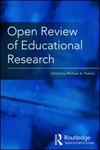Debating Digital Childhoods: Questions concerning technologies, economies and determinisms
Q1 Arts and Humanities
引用次数: 7
Abstract
Abstract The learning child, the child that is the object of interest through modernity and into mutated modernity, in the knowledge economy, is a digital age identity of great interest. Talk about childhood and the digital age invokes a range of questions about what is happening at this time and with these technologies and that creates more or less of a distinction that makes it both possible and necessary to start or to continue talking. This article identifies and engages with different positions in the debates on digital childhood. A range of philosophical questions are presented and their importance to the debates are explored. A series of metaphors and examples are presented in order to play, in a serious way, with the meanings and experiences and narratives of digital childhoods. To explore these questions it is worth considering a politics of digital childhoods and the ebb and flow of perceived tensions—of the sense that there is a problem with other ways of thinking about digital childhoods that are not accepted, not approved. That this talk might have the quality of a debate orients us to the probability that there will be significant differences in relation to not just the positions that can and should be taken in relation to children's digital lives but also what is meant by a digital age and digital lives. The focus of this article is constructing an overview of the debates around digital childhood and the ways in which the work of a philosophical line of questioning might contribute to the debate.辩论数字童年:有关技术、经济和决定论的问题
学习儿童,即通过现代性而进入突变现代性的儿童,在知识经济时代,是一个极具兴趣的数字时代身份。谈论童年和数字时代引发了一系列关于这个时代和这些技术正在发生的事情的问题,这或多或少创造了一个区别,使得开始或继续谈论成为可能和必要。这篇文章在关于数字童年的辩论中识别并参与了不同的立场。提出了一系列哲学问题,并探讨了它们对辩论的重要性。一系列的隐喻和例子被呈现出来,以一种严肃的方式来玩数字童年的意义、经历和叙述。为了探索这些问题,我们有必要考虑一下数字童年的政治,以及感知到的紧张关系的起起落落——这种感觉是,关于数字童年的其他思考方式存在问题,这些方式不被接受,不被认可。这次演讲可能会有辩论的性质,这使我们认识到,可能会有显著的差异,不仅是关于孩子们的数字生活可以和应该采取的立场,还有关于数字时代和数字生活的含义。本文的重点是构建围绕数字童年的辩论的概述,以及哲学问题的工作可能有助于辩论的方式。
本文章由计算机程序翻译,如有差异,请以英文原文为准。
求助全文
约1分钟内获得全文
求助全文
来源期刊

Open Review of Educational Research
EDUCATION & EDUCATIONAL RESEARCH-
CiteScore
2.60
自引率
0.00%
发文量
0
审稿时长
22 weeks
 求助内容:
求助内容: 应助结果提醒方式:
应助结果提醒方式:


